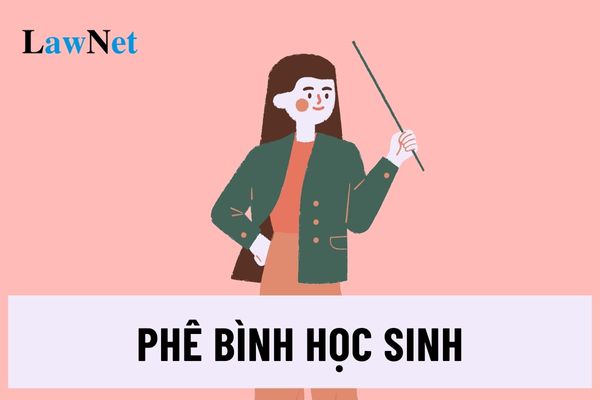Vietnam: Are primary school teachers allowed to criticize students in front of the class or during a meeting with parents?
Who are teachers in Vietnam?
Clause 1, Article 66 of the Law on Education 2019 stipulates as follows:
Position, roles of teachers
1. Teachers are persons who carry out teaching and educating at educational institutions, except for educational institutions prescribed in point c clause 1 Article 65 of this Law.
Teachers working at institutions of preschool education, general education and other educational institutions or teaching primary-level, intermediate-level are called teachers; teachers of colleges and higher qualifications are called lecturers.
2. Teachers play the decisive role in ensuring education quality, hold an important position in society and are honoured by society.
Teachers are persons teaching at at institutions of preschool education, general education and other educational institutions or teaching primary-level, and intermediate-level.
Are primary school teachers in Vietnam allowed to criticize students in front of the class or during a meeting with parents?
Article 38 of the Primary School Regulations promulgated with Circular 28/2020/TT-BGDDT stipulates that students with shortcomings in learning, training, and competitive movements, depending on the level of violation, may face the following disciplinary measures:
Remind, directly support to help students improve;
Notify parents to cooperate in helping students overcome shortcomings.
Teachers are not allowed to criticize students in front of the class, in front of the whole school, or during a meeting with parents.
Thus, primary school teachers are not allowed to criticize students in front of the class or during a meeting with parents.

Are primary school teachers in Vietnam allowed to criticize students in front of the class or during a meeting with parents?
What are the conditions for becoming a primary school teacher in Vietnam?
Under Article 72 of the Law on Education 2019, the standardized educational qualifications of teachers are as follows:
Standardized educational qualifications of teachers
1. Standardized educational qualifications of teachers are regulated as follows:
a) Teachers of preschool education teachers must possess at least a pedagogical college diploma;
b) Teachers of primary education, lower secondary education and upper secondary education must possess at least a bachelor’s degree in pedagogy training.
In case a subject is yet to acquire enough teachers with bachelor’s degree in pedagogy training, teachers of this subject must possess a bachelor's degree of suitable specialization and a certificate of pedagogy training;
c) Lecturers of higher education must possess a master’s degree; lecturers teaching or instructing master or doctor’s theses must possess a doctoral degree.
b) Standardized educational qualifications of teachers working in institutions of vocational education shall follow regulations in the Law on Vocational education.
2. The Government shall specify road maps for improving standardized educational qualifications of teachers of preschool education, primary education and lower secondary education as prescribed in point a and point b of clause 1 of this Article. Within the scope of their duties and authorities, the Minister of Education and Training and Minister of Labour - War Invalids and Social Affairs shall stipulate employment of teachers not meeting criteria prescribed in clause 1 of this Article.
Thus, to become a primary school teacher, one must have a bachelor's degree in pedagogy training or higher.
In case a subject is yet to acquire enough teachers with bachelor’s degree in pedagogy training, teachers of this subject must possess a bachelor's degree of suitable specialization and a certificate of pedagogy training.
How many lessons per week must primary education teachers in boarding ethnic secondary schools in Vietnam teach according to regulations?
Under Clause 1, Article 6 of the working regulations for general education teachers issued with Circular 28/2009/TT-BGDDT as amended and supplemented by Clause 5, Article 1 of Circular 15/2017/TT-BGDDT:
Teaching lesson norms
The teaching lesson norm is the number of theoretical or practical lessons each teacher must teach in a week. To be specific:
1. The teaching lesson norm for primary school teachers is 23 lessons; for lower secondary school teachers, it is 19 lessons; and for upper secondary school teachers, it is 17 lessons;
2. The teaching lesson norm for teachers at boarding ethnic secondary schools is 17 lessons at the lower secondary level and 15 lessons at the upper secondary level.
The teaching lesson norm for teachers at semi-boarding ethnic secondary schools is 21 lessons at the primary level, 17 lessons at the lower secondary level.
The teaching lesson norm for teachers at schools or classes for the disabled or handicapped is 21 lessons for primary school teachers and 17 lessons for lower secondary school teachers.
The teaching lesson norm for teachers at pre-university schools is 12 lessons.
3. A teacher acting as the leader of the Ho Chi Minh Young Pioneer Organization of a Grade I school teaches 2 lessons a week, a Grade 2 school teaches 1/3 of the teaching lesson norm, and a Grade 3 school teaches 1/2 of the teaching lesson norm of teachers of the same education level. The classification of schools follows current regulations.
Thus, primary education teachers in boarding ethnic secondary schools in Vietnam must teach 21 lessons per week.

